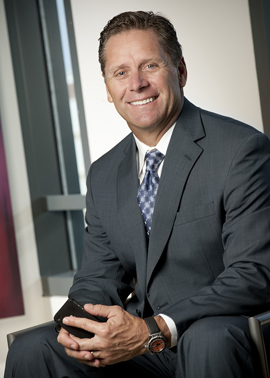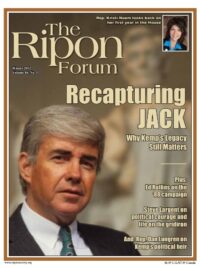
I developed a keen appreciation for the courage required to play quarterback successfully during my football playing career, which included 14 years with the Seattle Seahawks in the National Football League.
It is not a position for false bravado. I saw many young quarterbacks coolly stroll into a huddle, call a play, and once the ball was snapped, turn into mush in the face of 300-plus pound behemoths bearing down on them with the intention of dislodging them from their senses and shattering the limits of their body’s durability.
Risking life and limb, quite literally, is not for the faint of heart. Focusing on the collective task at hand — while ignoring the very real chance of personal peril — requires a combination of skill, awareness, and fearlessness that few of us possess. Jack Kemp had it, and it was those very same qualities, finely developed during his outstanding football career, that were expressed in his exemplary record of public service.
I saw many young quarterbacks coolly stroll into a huddle, call a play, and once the ball was snapped, turn into mush in the face of 300-plus pound behemoths bearing down on them…
Jack was a professional quarterback for 13 years, most of those spent as one of the legendary pioneers in the fledgling American Football League. He was named Most Valuable Player of the AFL in 1965, and played in its title game in five of the 10 years in which he was a member of the league, winning two of them. He consistently was among the league’s leaders in the key areas by which quarterbacks are measured, and his physical skills were immense.
But what additionally separated Jack from so many others who played the position was the confidence that he inspired in his teammates, who saw his passion, commitment, and unswerving faith in them, and in turn elevated their performance to heights they might not have thought possible. He was fearless under fire, a calming presence in the face of adversity whose performance was positive proof of the champion qualities he embodied. Jack believed in himself, and that faith transcended into the world of public service, where he exhibited the very same array of traits and achieved comparable levels of enormous accomplishment.
In fact, I don’t think Jack skipped a beat the day he left the football field and entered the arena of national politics. Whether it was as a nine-time Representative from the Buffalo area, Secretary of Housing and Urban Development, a presidential candidate in 1988, or on the Republican ticket as the nominee for Vice-President in 1996, he was always bold and clear in his thinking, dogged in his determination to succeed, and absolutely confident and optimistic in being able to achieve his goals. Those characteristics were undoubtedly fashioned by his football experiences.
[Jack] was fearless under fire, a calming presence in the face of adversity whose performance was positive proof of the champion qualities he embodied.
I was fortunate to learn first-hand about Jack’s impeccable timing and tremendous empathy, which were also honed on the football field. I ran into him shortly after I had been defeated in my run for House Majority Leader, an event that occurred in a rather tumultuous time in the Republican Party’s congressional history. Perhaps sensing more disappointment than I was willing to let on, Jack ended our conversation by quoting one of my favorite historical figures, Sir Winston Churchill. He told me, “Steve, I want you to remember that success is not final, failure is not fatal: it is the courage to continue that counts.”
That message might have been intended for me that day, but it could very well have been the mantra of Jack’s life. He experienced his share of victories and defeats, but an enduring constant in his life was his courage in facing taxing challenges, remaining focused on a task, staying true to his ideals, and displaying an inspirational optimism.
That’s what made Jack Kemp a leader, on and off the field.
Steve Largent is President and CEO of CTIA-The Wireless Association®. From 1994 to 2001, he represented the 1st Congressional District of Oklahoma in the U.S. Congress. Prior to his election to Congress, he spent 14 years as a Pro Bowl wide receiver with the Seattle Seahawks, earning induction into the Pro Football Hall of Fame in 1995.




